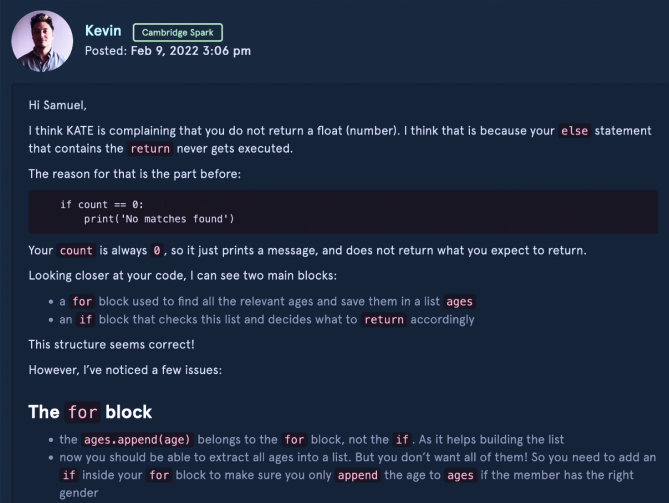AI Transformation Specialist Apprenticeship (Level 4)
Master the skills to leverage AI responsibly, drive accelerated business outcomes and futureproof your career in the AI era.

Learn how to deliver real business impact with AI in your organisation
35% revenue increase by optimising sales process and data
215 hours per year by optimising processes
£60,000 saved per year by process and tool optimisation
90% shorter project times achieved though automations
Accelerate Your Organisation's AI-Driven Transformation
Over the course of 14 months, Cambridge Spark's AI Transformation Specialist Apprenticeship equips professionals with the cutting-edge skills to leverage AI responsibly and drive accelerated business outcomes. This programme empowers employees to identify high-impact opportunities for AI implementation, manage complex AI projects, and lead organisational change.
Apprentices will develop the expertise to analyse business processes, translate user requirements into AI-driven solutions, and implement ethical AI practices. By mastering both the technical and strategic aspects of AI transformation, graduates of this programme will be uniquely positioned to futureproof their careers while delivering guaranteed ROI for their organisations in the rapidly evolving AI era.
Eligibility
Suitability of role
- Working to introduce digital and data-driven products, approaches or tools as part of the their organisation’s digital transformation
- Will have access to business modelling tools
- Able to apply business analysis skills to specific projects at work
- This innovative apprenticeship utilises the Level 4 Business Analyst standard, enhancing it with specialised AI transformation skills to meet the demands of the digital age.
Eligibility for funding
- No prior business analyst degree or related experience.
- Employed in England and resident in the UK or EEA for the last 3 years.
- Employees working at least 30 hours a week (part-time employees can be considered for a minimum cohort size)
- Can commit to the minimum 6 hours a week off the job learning requirement for the duration of the programme (14 months of training)
What makes the programme special
We deliver all of our programmes online, helping our clients offer flexible and inclusive programmes open to all of their staff. EDUKATE.AI, our online learning platform, gives learners a sandbox environment to practice their skills, providing them with immediate feedback on industry-simulated assignments. We believe that the gold standard for online delivery is to offer a mix of experiential learning, coaching, technical mentorship and peer support.
Personalised Learner Support
We provide each learner with a dedicated Digital Mentor and Learner Success Coach to support them on their technical and personal development. This personalised support structure helps learners to succeed and overcome obstacles they encounter.
Expert Curriculum
Our comprehensive curriculum develops the skills for success in digital transformation. As well as core digital business analyst skills needed for a modern professional, the curriculum includes specialist electives for those working on digital products.
Flexible Fully Online Learning
Our program is fully online, providing maximum flexibility for learners and employers alike. This means that learners can access their content from anywhere, with no set up or installation of EDUKATE.AI required.
Data-Led Transformation
Digital transformation is driven by data. We ensure that our learners understand the value of data in making decisions and how to analyse the data they are using in their projects
Instant Feedback for Accelerated Learning
Our program benefits from the support of EDUKATE.AI, which provides instant feedback on quizzes and other assignments, while the built-in Knowledge Base fosters peer learning through a dedicated question forum.
Real-World Practice for Accelerated Impact
EDUKATE.AI provides a sandbox environment where learners can practice new skills on real assignments along with with in-browser access to their slides, lecture recordings, quizzes and practical assignments.
Community
Joining our program means becoming part of a thriving community of thousands of data and digital professionals. Learners have the opportunity to tap into this rich network of peers and alumni and benefit from the expertise and experience of others in the field.
A real-world learning experience
EDUKATE.AI is our learning experience platform which delivers a seamless experience in one place and accelerates learning and impact through real practice on real projects with immediate, personalised feedback on code.

The Curriculum
Our curriculum is developed by our leading faculty, composed of consultants, data & AI experts in leading industry positions and academics from some of the top universities in the world.
Core Modules
- Foundations of AI
-
Explores the fundamentals of AI technology, its organisational potential, and key implementation risks for business professionals.
- AI-Driven Business Analysis and Transformation
-
Examine the crucial role of Business Analysts in driving AI adoption. Develop future state operating models with AI enhancements and identify the actions to implement them.
- Stakeholder Engagement and Communication
-
Explore effective communication and stakeholder engagement techniques to support business analysis. Dive into the principles of engaging both internal and external stakeholders, learn techniques to identify and analyse their interests and influences, and build lasting, positive relationships.
- Data and AI for Business Value
-
Explore the crucial role of data in AI-driven business improvement, covering topics from data valuation and elicitation to model development and decision-making.
- Identifying and Managing Requirements for AI-Enabled Projects
-
Learn a range of techniques for identifying, categorising, and prioritising both functional and non-functional requirements when identifying and implementing AI solutions.
- Process Modelling and Optimisation for AI Implementation
-
Deep dive into the fundamentals of process modelling and its significance in understanding and improving organisational business processes, with a particular focus on incorporating AI tools. Learn techniques for eliciting process information from stakeholders and modelling business processes, redesigning them to enhance efficiency.
- Managing Business Change and Impact
-
Explore the critical role of the business analyst in facilitating business acceptance of changes, particularly in the context of AI implementation. Learn quality assurance techniques and the importance of business change impact assessment, including the evaluation of impacts on people, processes, organisation, technology, and information.
- Emerging AI Trends
-
Explore the latest AI trends and learn how to integrate them into your business analysis practices while adhering to legislation and industry standards. Gain an understanding of the ethical implications of AI, ensuring responsible use of these powerful technologies.
FAQs
What delivery options do you offer?
We tailor our delivery to your workforce needs. This ranges from independent, immersive elearning supported by EDUKATE.AI through to tailored bootcamps, to our structured apprenticeship programmes. This apprenticeship is funded by the Level 4 Business Analyst standard for learners based in England.
Are you able to tailor the programme to the organisation and sector?
Yes. We work with our clients to contextualise our programmes to their organisation and sectors they operate in. We do this through bespoke assignments and guest lectures from industry experts. We also work with a range of partners to create bespoke programmes for sectors, such as health and journalism.
What is an apprenticeship?
Apprenticeships are a long-term training commitment which seek to support people entering the workforce and upskill existing UK-based employees within an organisation, enabling employers to foster a workforce consisting of highly-skilled and highly-engaged talent.
The Cambridge Spark AI Transformation Specialist Apprenticeship runs for 14 months plus a 3-month end-point assessment and includes a minimum of amount of 6 hours per week off-the-job training, enabling a blended approach between theory and practical learning.
What is the Apprenticeship Levy?
The UK government introduced the Apprenticeship Levy scheme in April 2017 as a way to drive investment in strengthening the country’s skills base.
All organisations with annual staff costs of over £3m have to pay 0.5% of their salary bill into a ring-fenced apprenticeship levy pot. The money is collected monthly via PAYE and can only be used for training on approved apprenticeship schemes (such as the Level 4 AI Transformation Specialist Apprenticeship that we offer). Organisations must forfeit any levy funding left unspent for 24 months or more.
What if my organisation doesn't pay into the UK Apprenticeship Levy?
An organisation that doesn't pay into the levy can still qualify for government-funded apprenticeships for their staff. In fact, the UK government will sponsor 95% of the apprenticeship programme, leaving the organisation to invest the remaining 5%, provided that learners otherwise meet eligibility criteria.
What does "off-the-job training" mean?
Off-the-job training is defined as learning undertaken outside of the day-to-day work duties and during the apprentice’s normal working hours.
Our off-the-job training is delivered on a flexible basis and can be carried out at the apprentice’s place of work or home.
The 6 hours per week, minimum, off-the-job training provides learners with the time to focus and develop the required skills, knowledge and behaviours to complete the programme.
How much do managers need to be involved?
Managers will need to ensure apprentices achieve their planned off-the-job training hours and work on their project portfolio.
We also encourage managers to have regular one-to-one meetings with apprentices to catch up on how they are progressing and to join the apprentice and their coach for 30 minutes every 3-4 months for a general catch up about the programme.
Enquire now
Fill out the following form and we’ll contact you within one business day to discuss and answer any questions you have about the programme. We look forward to speaking with you.
Fill out the following form and we’ll contact you within one business day to discuss and answer any questions you have about the programme. We look forward to speaking with you.
Who's benefitted from our data apprenticeships
Why we’re the education technology training partner of choice.

Case study
Product Manager Grows Team Capacity by a Projected 647 Hours

Case study
Data Analyst Apprentice identifies £30k of savings for GSK

Case study
Deep Learning and Natural Language Processing (NLP) Training for Deloitte

Case study
Developing Python Programming Skills Within the NHS